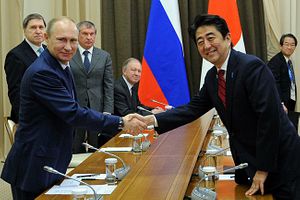When Japanese Prime Minister Shinzo Abe came to power in December 2012, he inherited intractable territorial disputes with China and South Korea. However, he appeared to have some latitude to move one territorial dispute toward resolution: the dispute with Russia over the Kuril Islands, which Japan calls the Northern Territories. Despite his determination to compromise in order to reach a deal, Abe’s efforts unraveled along with the situation in Ukraine.
Following the outbreak of the Ukraine crisis and Russia’s annexation of Crimea, Japan sided with the U.S. and European states to sanction Russia last fall, despite promising movements toward a peace treaty between Tokyo and Moscow. Though the Japanese sanctions themselves were expected to only have minimal impact on Russia, it was an important signal to demonstrate Japan’s commitment to the priorities of the other Group of Seven (G7) nations. The sanctions also give credence and weight to Abe’s pledge to pursue a more “proactive” role in the global pursuit of peace.
Russia’s foreign ministry criticized Japan’s decision to expand sanctions last September, saying, “We view this unfriendly move as fresh evidence of Japan’s inability to pursue an independent foreign policy. By approving sanctions under external pressure, Tokyo is harming above all its own geopolitical standing.”
Paralyzed by Western demands as long as the situation in Ukraine remains frozen, the Japanese government appears unable to regain the initiative shaping its relationship with Russia.
The most recent debacle came from within, in the form of former Japanese Prime Minister Yukio Hatoyama’s visit to Crimea from March 10 to 15. Crimea was annexed by Russia on March 18 last year, although Western governments refuse to acknowledge Russian control over the peninsula as legitimate. Hatoyama conducted his visit despite opposition from the Japanese government. Tokyo was concerned that if Hatoyama entered the region on a Russian visa, it would subvert the official Japanese position that Russia illegally and unilaterally took the territory from Ukraine. Hatoyama expressed the opinion that the referendum to split from Ukraine was conducted democratically and legitimately, even though it was rejected by the international community.
The Japanese government criticized Hatoyama’s visit, with Chief Cabinet Secretary Yoshihide Suga telling reporters, “Russia’s annexation of Crimea is in violation of Ukraine’s sovereignty and territorial integrity. Japan by no means approves of such attempts to change the status quo with force.” Suga added, “[Hatoyama’s] behavior is grossly impudent and extremely regrettable for someone who experienced the office of prime minister.”
Hatoyama’s visit came a day after Abe and German Chancellor Angela Merkel reaffirmed their commitment to not tolerate the use of force in changing the status quo. Even the Democratic Party of Japan, which Hatoyama led to victory in 2009, is trying to distance itself from Hatoyama.
During his visit, Hatoyama brought up another continuing source of tension between Japan and Russia: the disputed Kuril Islands. Hatoyama referenced the need to resolve the island dispute by reaching an accord with Putin, and even suggested a quid-pro-quo for a change in Tokyo’s position on the Ukraine situation. “The Northern Territories will be returned only when President Putin is in power,” Hatoyama said. “In resolving the Northern Territories issue, we need to understand what Russia thinks about Crimea.” Resolution of the territorial dispute remains a significant challenge to any Russo-Japanese peace process.
The next step to watch in Russo-Japanese relations will be Sergey Naryshkin’s visit to Tokyo in May to attend a cultural exchange event. Naryshkin is chairman of Russia’s lower house and a close aide to Putin. Sources told The Yomiuri Shimbun that Japan will issue Naryshkin a visa despite the chairman being placed on a list of Russian subjects banned from the U.S. and European countries. Naryshkin attended the same event last June – when he was already on the list of banned Russian officials. Naryshkin will also most likely seek meetings with Japanese officials and politicians, including Abe.
Japanese officials and politicians approached by Naryshkin will undoubtedly be cautious in handling these requests. Though good Russo-Japanese relations are important to Japan, so are good relations with the U.S. and European states. So long as the crisis in Ukraine goes unresolved, Japan must play a delicate balancing act between pursuing its own narrow national interests vis-à-vis Russia, and standing shoulder to shoulder with the U.S. and European states to uphold international law and the sanctity of nation-states’ sovereignty and territorial integrity.
































